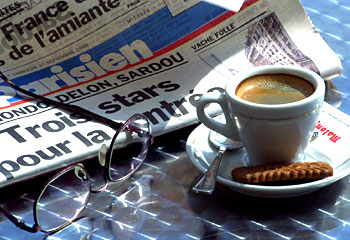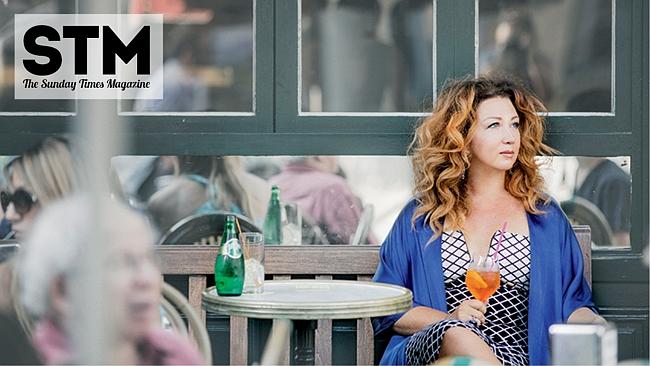Tourist etiquette for the Rugby World Cup
HEADING to the Rugby World Cup? Stephen Clarke has some words of advice on how to handle Parisian waiters and other French cultural oddities.

RUGBY union fans visiting France always impose their national character on the place: The Scots roam the streets in their kilts; the Irish invade wearing bright orange wigs; the English – well, the English just wander around looking nervous, as is their national habit.
The French generally take kindly to rugby fans, who tend to be better behaved than soccer crowds. So Australian fans should be sure of a friendly welcome at the World Cup, as long as you obey a few simple rules.
First, the good news. France has a temperate climate, so there are no cane toads, great white sharks or salties to worry about. There are, on the other hand, Parisian waiters, who on a bad day can be about as welcoming as a saltie with a persecution complex.
Seeing that Australians are (so they tell me) fond of the occasional alcoholic beverage, the waiter is going to play a key role in the quality of your stay, so you need to know how to tame him.
Learn to speak a few useful words
In fact, it's pretty simple. All you need is one little word – "bonjour". This, in case you didn't already know, is the French word for "g'day".
When you sit down at a cafe table or go to prop up the bar, it has to be the first word you say. (That, or its evening equivalent, "bonsoir".) If you say this with a happy smile, the fiercest waiter will feel morally obliged to be pleasant to you, even if it's the only bit of French you use in the whole conversation.
Forgetting the key word can be catastrophic, even for non-Australians.
I was once sitting at a cafe enjoying one of my 10 daily espressos when a busy-looking French woman sat down at the next table. The waiter came over and said, "Bonjour, Madame".
Without taking her eyes off her Blackberry, the woman asked for "Un cafe, s'il vous plait". ("A coffee, please.") The waiter didn't budge. He glared down at her and said "Bonjour" again.
Not understanding what she was doing wrong, the woman repeated her order. The waiter gave her another glare – and another "Bonjour".
At last the penny dropped. The woman looked up, smiled, said "Bonjour" and asked for a coffee.
Satisfied, the waiter went off to get her order. Of course he took ages to bring it, even though she was clearly in a rush. But then she did deserve some punishment, didn't she?
Many waiters, it has to be said, are friendly from the outset. These are the ones who are ripping you off.
Be careful what you ask for
On the Champs-Elysees and other tourist areas like Saint Germain des Pres, I often wince at the sight of the visitors sitting there with their bucket-sized glasses of beer. They've made the mistake of asking for "une biere" with a strong foreign accent.
When the waiter hears this, he has two choices. A mean one will just bring a two-litre flagon that will cost about the price of a plane ticket from Sydney to Brisbane, via New York.
Nicer waiters will ask you "Petite, moyenne ou grande?" ("Small, medium or large"), but whatever you answer, you'll end up paying far more than a French person.
The secret is to know one essential word – "demi". This is the French word for a normal-sized beer – 25 centilitres, just bigger than a half-pint. (So yes, that means Bruce Willis's ex-wife's name translates as Half-Pint Moore.)
I realise that no self-respecting Australian rugby fan is going to be satisfied with a mere "demi" (well, not after breakfast, anyway), so you might like to ask for "cinquante centilitres de biere" (pronounced "sank-ont sontee-leetra"), which is about a pint.
Lots of cafes serve "pintes" these days, too, though you might find it a little weird to order a size of beer that's pronounced "pant".
Don't jump on tables and sing Kylie Minogue songs
The early autumn evenings will be pretty warm in France, so it's safe to assume that the partying will go on well into the night. This is where Aussies need to be especially careful.
For a start, you must understand that the French don't know the words to any Kylie Minogue songs. So leaping on to a table and yelling "I should be so lucky" won't earn you a chorus of "lucky, lucky, lucky", as it would in London. It will just make you look slightly silly, silly silly.
Similarly, there's no point trying to convince anyone that Australia can claim credit for such giants of world culture as Olivia Newton-John, the Bee Gees and AC/DC, because the French think they're American. Your only hope of imposing your musical heritage on France is to come armed with a didgeridoo, and even then someone will probably ask you how much tobacco it takes to fill it.
But there's one aspect of French life where Australians have an advantage over other tourists.
Look left, then right, then left
As we Europeans know, you can't go anywhere near an Australian road without bumping into a kangaroo. So the 'roo-style driving habits of the French will hold no fears for you. The drivers here are basically marsupials with no road sense.
Crossing the road in Paris, for example, can be lethal. Even if the little green man at the traffic lights tells you that you, the pedestrian, have right of way, there will almost always be a driver who thinks that waiting at red lights is for people with nothing better to do.
He will drive straight at you, certain that he's in the right. Frenchmen are always in the right, whatever they do. So it's obvious to a Frenchman that he knows better than a mere electric light whether it is safe to drive through.
You'll probably head south after visiting Paris (Australia's pool matches are outside the capital), where crossing the road is less of a problem. Non-Parisian drivers are much more courteous, and often stop for pedestrians without being forced to. This always amazes Parisians, and confirms their view that their provincial compatriots are idiots.
However, being anywhere near a road in the south of France after midnight can be a heart-stopping experience, because southerners seem to believe it is simple to drive a Renault while suffering from alcohol-induced blindness.
Down South, they know how to drink
The people down there take their rugby very seriously indeed, and have a similar attitude to drinking. A typical Montpelier rose might taste like raspberry juice, but you will notice the difference the morning after a drinking session with the locals when you wake up to find that your tongue tastes like a Toulouse rugby player's shorts.
This is no way to suggest that Aussies drink to excess. In my view, any nation capable of inventing the sport of "cane toad golf" has to be pretty sober.
Anyway, that just about sums up the pleasures and perils awaiting any Australians lucky enough to come to France to see the World Cup.
As you wander the streets, you'll have to watch where you walk, because there might be some English rugby fans, flat out on the pavement, weeping about their latest defeat. And though it might be tempting to laugh, European etiquette dictates that you use a specific phrase in this situation. It goes like this: "Come, my English cousin, let me buy you a beer in honour of our two nations' friendship."
Stephen Clarke is the author of Talk to the Snail, The Ten Commandments for Understanding the French. His latest novel is Merde Happens (both published by Random House Australia).



